
Literature is the only genre that lets us explore the human experience as it is lived hourly, daily, weekly. It lets us ‘be’ a panoply of people, some with lots in common, but many more with nothing but our shared humanity. Reading was authentic DIE—diversity, inclusion, equality—not the manufactured version being shoved down our throats by the Left.
As postmodernism began to gain traction in the latter part of my century and now dominates in the 21st century, literary fiction degenerated into the droning drivel of some entitled snowflake’s ‘truth’. After a spurt of rage at the emptiness of another prize-winning novel, I quickly became bored and refused to grant the author another moment of my precious time.
Over my long life, I have never quit reading so many books as I have in the 21st century.

With waste of time, waste of money becoming a depressing theme in the life of this reader, I turned to the perennial book for sustenance. It didn’t disappoint. As I wrote in Blog Number 54, July 2020:
…an ancient book presented in a new and beautiful way—the WORDonFIRE Bible (Volume 1): The Gospels. Surrounding the timeless text is commentary by the Church Fathers, saints, mystics, Christian scholars and Bishop Robert Barron, its ‘author’, along with works of art and writing. The result is “A Cathedral in Print” to illuminate Catholic Christianity.
So I began my journey on the ‘via pulchritudinis’—the way of beauty.
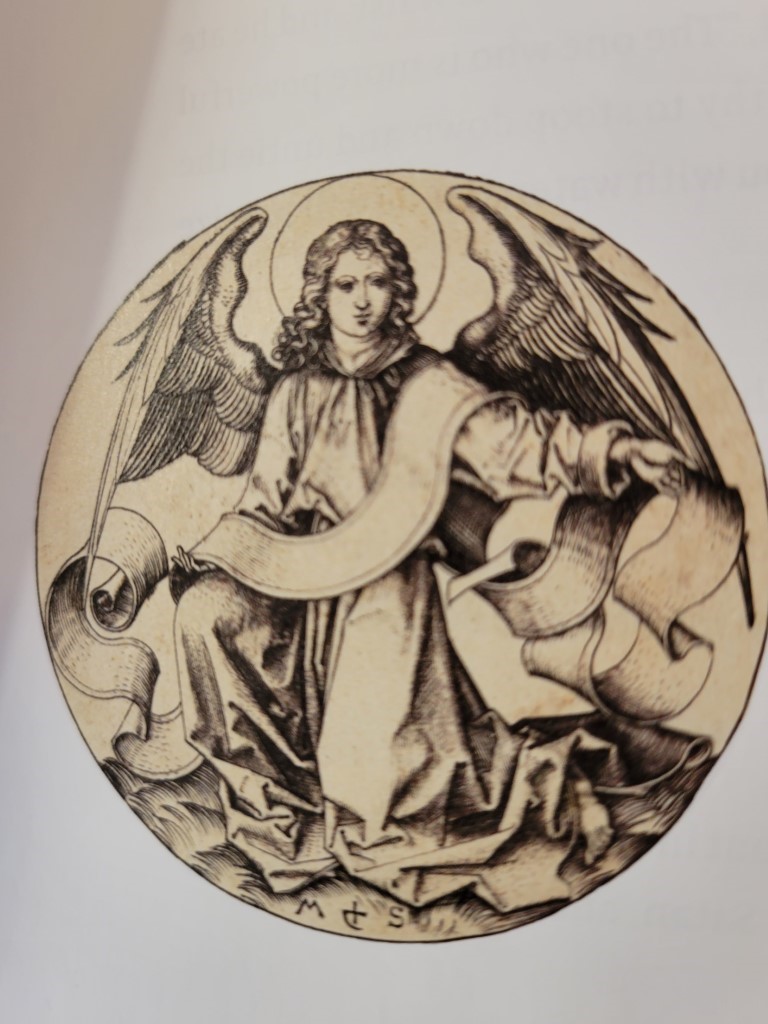
In St. Jerome’s scheme, the man represents Matthew because his gospel begins with Jesus’ genealogy, emphasizing Jesus’ humanity.
And so we begin, beginning with the genealogy of Jesus. The Bible records Jesus’ family tree, “Because it was desperately important for Matthew to show that Jesus came out of a rich, densely textured history…a long line of characters…:saints, sinners, cheats, prostitutes, murderers, poets, kings, insiders and outsiders—all leading to Christ,” writes Bishop Barron. This was his patrimony, embedding him in the human family to prepare him for his role as our saviour.
The Beatitudes. When Jesus speaks, his words are as alive today as they were when he first spoke them. Their cadence echoes down the centuries, permeating literature with their beauty and truth.
Matthew 5:2-8 – The Beatitudes,
…Then he began to speak, and taught them, saying:
“Blessed are the poor in spirit, for theirs is the kingdom of heaven.
“Blessed are those who mourn, for they will be comforted.
“Blessed are the meek, for they will inherit the earth.
“Blessed are those who hunger and thirst for righteousness, for they will be filled.
“Blessed are the merciful, for they will receive mercy.
“Blessed are the pure in heart, for they will see God.
Matthew 6:1 – Beware of practicing your piety before others in order to be seen by them…
When I was a child, a certain Mrs. B used to parade her piety at every Sunday Mass, so blatantly that even young children understood there was something a little off in her performance. But she was a good & caring woman, a paragon of virtue compared to the strident righteousness of today’s social justice warriors who demand we live according to their infinite wisdom gained in a young life of little reading and even less thought.
A parable. The parable of the sower contains the seed of wisdom. When seed is thrown on rocky ground, it will not flourish because understanding, its nourishment, is lacking. Everything good in life must be nourished with discipline and perseverance. In our ‘now’ cultures, these two characteristics are not celebrated, so seed is often sown on the rocky ground of immediate satisfaction or the goal is abandoned. And “…evil always insinuates itself into the very fabric of the good,” Bishop Barron says.
The artist. We’re all familiar with the colourful, joyful landscapes of Van Gogh, with many students decorating their dorm rooms with a poster of one of his paintings. It brings a splash of colour into an otherwise often drab space, and a burst of joy into an otherwise often fretful day. And they are beautiful! As Michael Stevens writes:
In fact, Van Gogh was so acutely aware of this interplay between creation and new life, he described it as an act of divine artistry: “Christ is more of an artist than the artists; he works in the living spirit and the living flesh. He makes men instead of statues.”
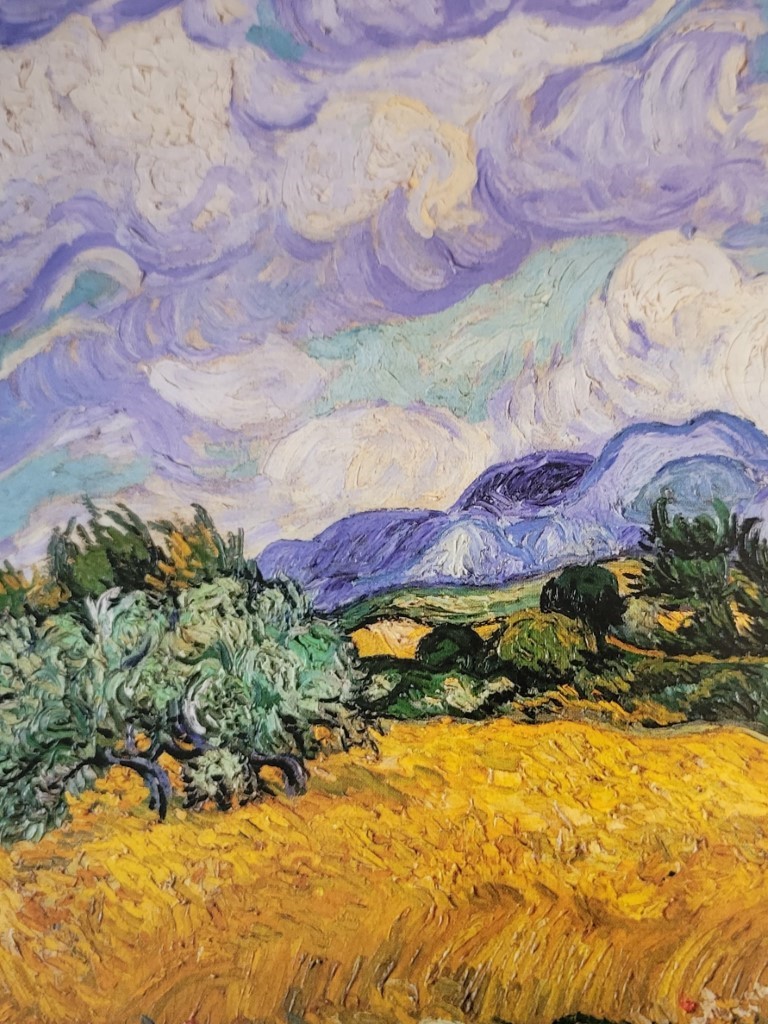
“Wheat Field with Cypresses” by Vincent Van Gogh, 1889
Upon this rock. The church will endure, according to G.K. Chesterton, in spite of weak popes and changing fashions because:
…he (Jesus) chose for its corner-stone neither the brilliant Paul nor the mystic John, but a shuffler, a snob, a coward—in a word, a man… But this one thing, the historic Christian Church, was founded on a weak man, and for that reason it is indestructible. For no chain is stronger than its weakest link.
Pillars of Christianity. Jesus’ words underpin the best of Western civilization, and we turn away from his wisdom at our peril.
Matthew 19:24 – Again I tell you, it is easier for a camel to go through the eye of a needle than for someone who is rich to enter the kingdom of God.
Matthew 19:30 – But many who are first will be last, and the last will be first.
Matthew 22:21 – Give therefore to the emperor the things that are the emperor’s, and to God the things that are God’s.
Matthew 23:23-24 – Woe to you, scribes and Pharisees, hypocrites!… You strain out a gnat but swallow a camel. (This describes perfectly what so many of our so-called elites do in their tortuous efforts to impose their leftist utopia on the rest of us!)
Matthew 25:35 – …for I was hungry and you gave me food, I was thirsty and you gave me something to drink, I was a stranger and you welcomed me.
Matthew 25:40 – Truly I tell you, just as you did it to one of the least of these who are members of my family, you did it to me.
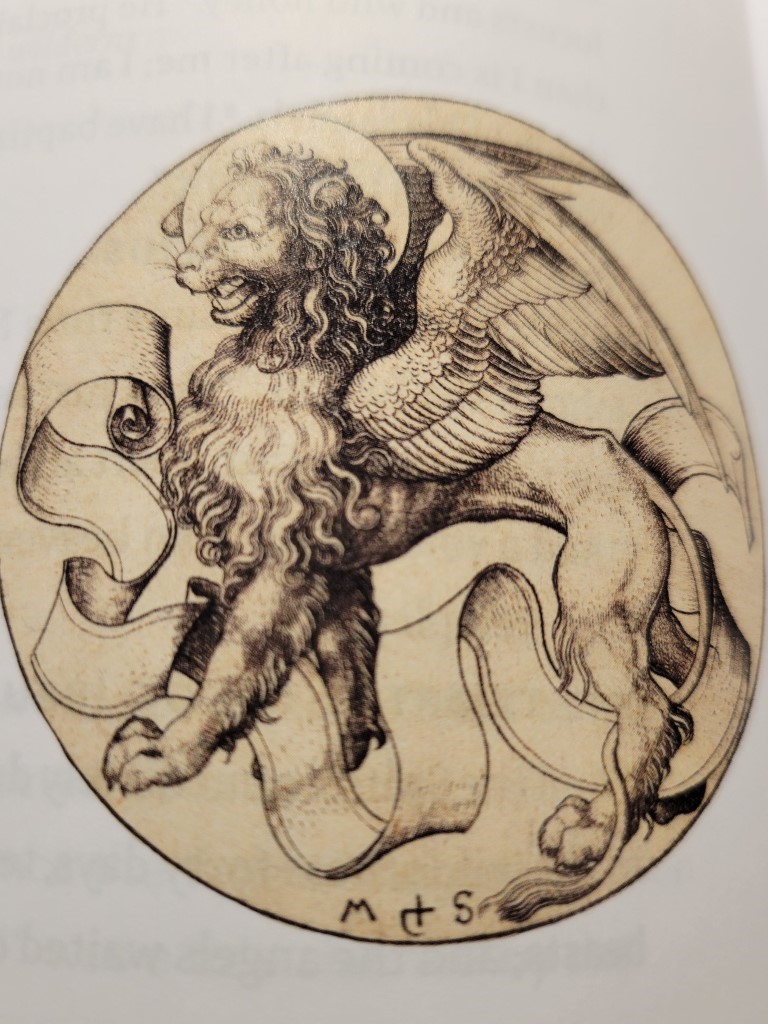
In St. Jerome’s scheme, the lion symbolizes Mark, comparing its opening passage—John the Baptist’s urgent proclamation in the desert—to the roar of a wild lion.
But though God typically lets the universe run according to its natural rhythms and patterns, what is to prevent God from shaping it and influencing it occasionally in remarkable ways, in order to signal his purpose and presence?
Battling the Devil. Jesus sends out his apostles, two by two, to battle the unclean spirits and cast out demons among the villagers—the unclean spirits and demons manifest at the Grammys 2023 in “Unholy” with lyrics and costumes celebrating Satan. Naturally, our ‘avant garde’ gushed over this transgression, pretending it was creative when it’s just a shoddy bit of juvenilia. But its result is seen in dysfunctional families and societies collapsing all around us.
Healing the Blind. In Mark 8:22-26, Jesus cures a blind man. There is blindness throughout the Bible, an image of mankind’s lack of spiritual sight and inability to see things as they really are. Bishop Barron writes:
Had he been immersed too completely in the attitudes, prejudices, and conventional viewpoints of the town? Martin Heidegger speaks of the tyranny of the man sage, “of what everybody says,” and Carl Jung knows the dangers of surrendering to the collective consciousness, to the mass movements and general attitudes that surround us.
Becoming One Flesh. We live in a world of vaunted vulgarity and pervasive promiscuity, where Christians are accused of being prudes because they value love and loyalty. But it’s been proven throughout the centuries that marriage between a man and woman is the foundation of a good society—a society of strong families that underpin our Western civilization.
Mark 10:7-9 – Jesus says, ‘For this reason a man shall leave his father and mother and be joined to his wife, and the two shall become one flesh.’ So they are no longer two, but one flesh. ‘Therefore what God has joined together, let no one separate.’
As Bishop Barron observes, Plato and perhaps John Calvin might have been puritans, but Jesus emphatically was not!
Paying Taxes. There is nothing inherently wrong with taxes as long as they are fairly collected and spent on the necessary shared infrastructure & services that keep our nation functioning and protect it from internal & external predators. When asked whether it is lawful to pay taxes to the emperor, Jesus replied,
“Give to the emperor the things that are the emperor’s, and to God the things that are God’s.”
The hypocrites who pretend righteousness were shocked at his answer, but good citizens know everything has to be paid for—there is no free lunch, as lefties of every stripe try to indoctrinate the young into believing. It is just a matter of governments fairly allocating the taxes they collect.
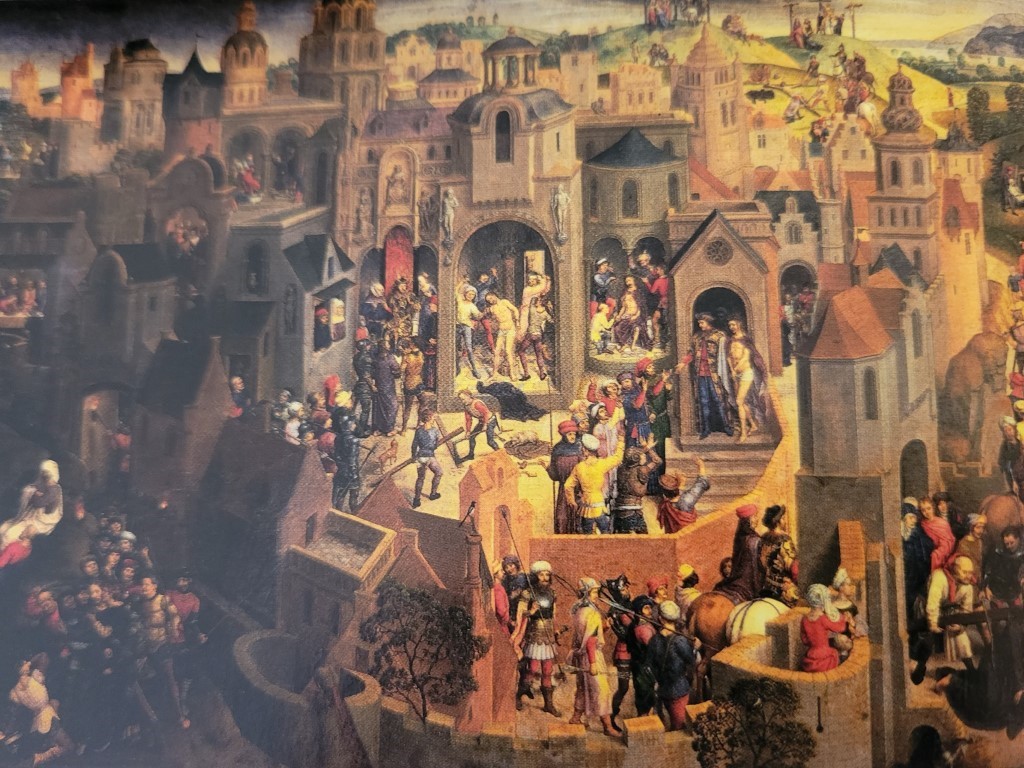
Dying for Our Sins. The end of Jesus’ life as a man approaches, and the world becomes dark in the middle of the day. Into this darkness,
Mark 15:34 – At three o’clock Jesus cried out with a loud voice, ‘My God, my God, why have you forsaken me?’
And he dies. But he does not break his covenant of dying for man’s sins. The Gospel of Mark ends on a triumphant note.
Mark 16:19-20 – So then the Lord Jesus, after he had spoken to them, was taken up into the heaven and sat down at the right hand of God. And they went out and proclaimed the good news everywhere, while the Lord worked with them and confirmed the message by the signs that accompanied it.
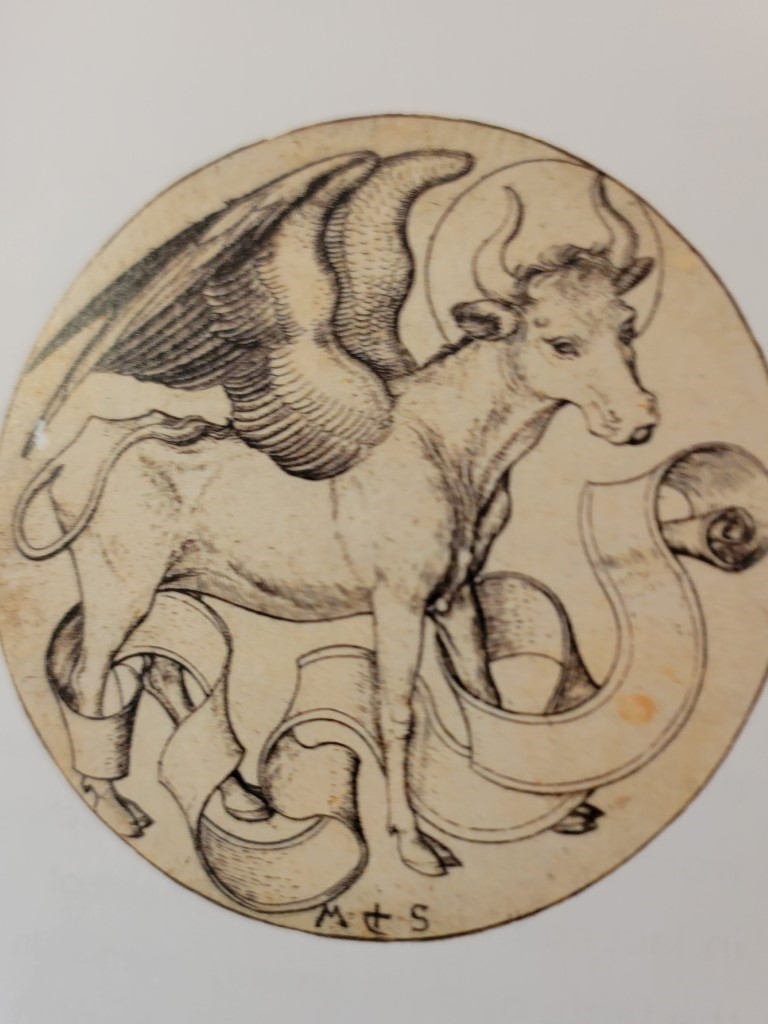 In St. Jerome’s scheme, the ox symbolizes Luke, whose gospel begins with the temple priest Zechariah, with the ox representing sacrificial animals associated with priestly duties.
In St. Jerome’s scheme, the ox symbolizes Luke, whose gospel begins with the temple priest Zechariah, with the ox representing sacrificial animals associated with priestly duties.
In their words…
Elizabeth Scalia, Editor-at-Large for Word on Fire Catholic Ministries. 1) “In comparison with the other Gospel writers, Luke is the one that gives us a distinct, richly detailed account of the ongoing interplay between God and humanity, heaven and earth—one that we can and do believe because, in this Gospel in particular, belief is grounded in plausible and subtle human reactions and responses.” 2) “…a good writer is a good reader, and a good storyteller is a good observer, and a good doctor is a good listener.” Luke, a doctor, brings all these qualities to his gospel.
Joseph Ratzinger, Pope Benedict XVI. 1) “The only way he (God) can redeem man, who was created free, is by means of a free ‘yes’ to his will. In creating freedom, he made himself in a certain sense dependent upon man. His power is tied to the unenforceable ‘yes’ of a human being.” 2) “From the moment of his (Jesus’) birth, he belongs outside the realm of what is important and powerful in worldly terms. Yet it is this unimportant and powerless child that proves to be the truly powerful one.”
G.K. Chesterton, writer, 1874-1936. For Chesterton, the distinction is not between sinners and nonsinners, but between sinners who know it and those who don’t. And that moment of recognition is a tremendous one in the life of a sinner.
St. John Henry Newman, 1801-1890. “The most obvious danger which worldly possessions present to our spiritual welfare is that they become practically a substitute in our hearts for that one object to which our supreme devotion it due.”
Thomas Merton, No Man Is an Island. “Only the lost are saved. Only the sinner is justified. Only the dead can rise from the dead, and Jesus said, (Luke 19:10) ‘For the Son of Man came to seek out and save the lost.’ ”
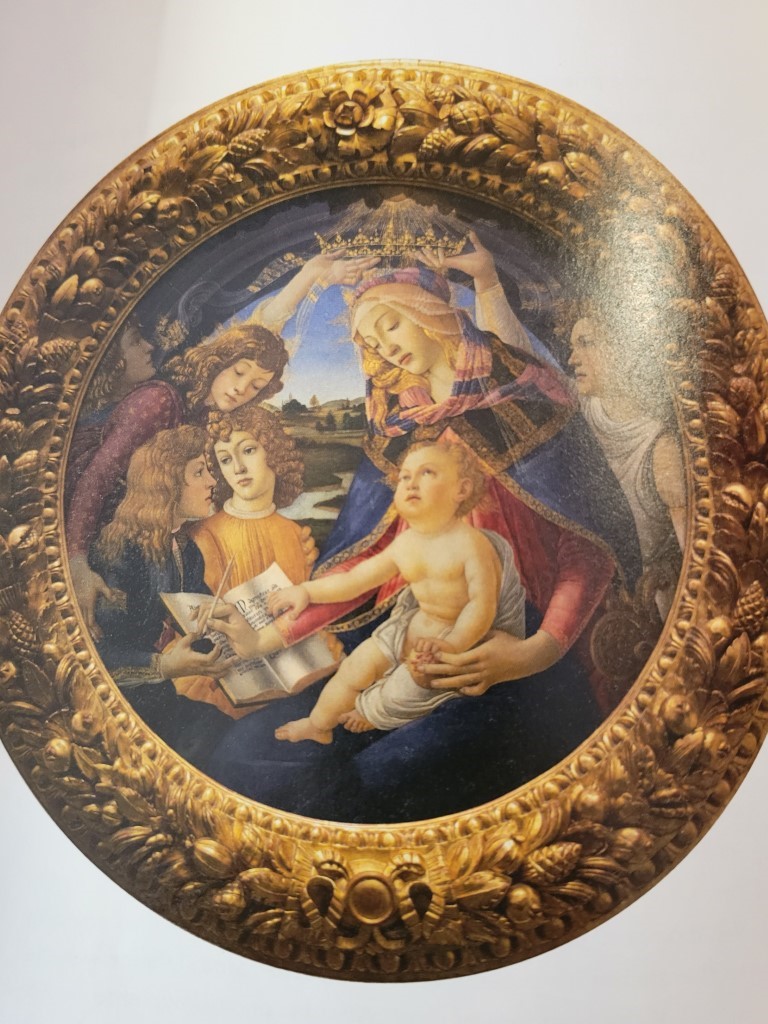
Bishop Barron. 1) “Upon declaring herself ‘the servant of the Lord’ and acquiescing to the angel’s request, Mary became the definitive Ark of the Covenant, the bearer of Yahweh’s presence.” 2) “Jesus entered the world, notes C.S. Lewis, so anonymously and clandestinely—as a baby born to insignificant parents in an out of the way corner of the Roman Empire—because he was a warrior compelled to slip quietly behind enemy lines.”
3) “Legitimate sentiment devolves into sentimentality precisely when it comes to supersede the call of God.” 4) “If you are rooted in God, then you can withstand anything, precisely because you are linked to the power that is creating the cosmos.”
5) “And one of the most striking and surprising of Jesus’ moves is a radical inclusion of women. He allows women into his inner circle (practically unheard of for a rabbi). He speaks publicly to the woman at the well. He engages with the Syrophoenician woman. He forgives the woman caught in adultery. And the first witnesses of the Resurrection are women.”
In Jesus’ words…
Luke 10:27 – You shall love the Lord your God with all your heart, and with all your soul, and with all your strength, and with all your mind, and your neighbour as yourself.
Luke 11:17 – Every kingdom divided against itself becomes a desert, and house falls on house.
Luke 11:23 – Whoever is not with me is against me, and whoever does not gather with me scatters.
Luke 13:18-19 – What is the kingdom of God like? And to what should I compare it? It is like a mustard seed that someone took and sowed in the garden; it grew and became a tree, and the birds of the air made nests in its branches.
Luke 15:7 – Just so, I tell you, there will be more joy in heaven over one sinner who repents than over ninety-nine righteous persons who need no repentance.
Luke 22:34 – I tell you, Peter, the cock will not crow this day, until you have denied three times that you know me.
Luke 23:34 – Father, forgive them; for they do not know what they are doing (as the spectators watched and the soldiers cast lots to divide Jesus’ clothing).
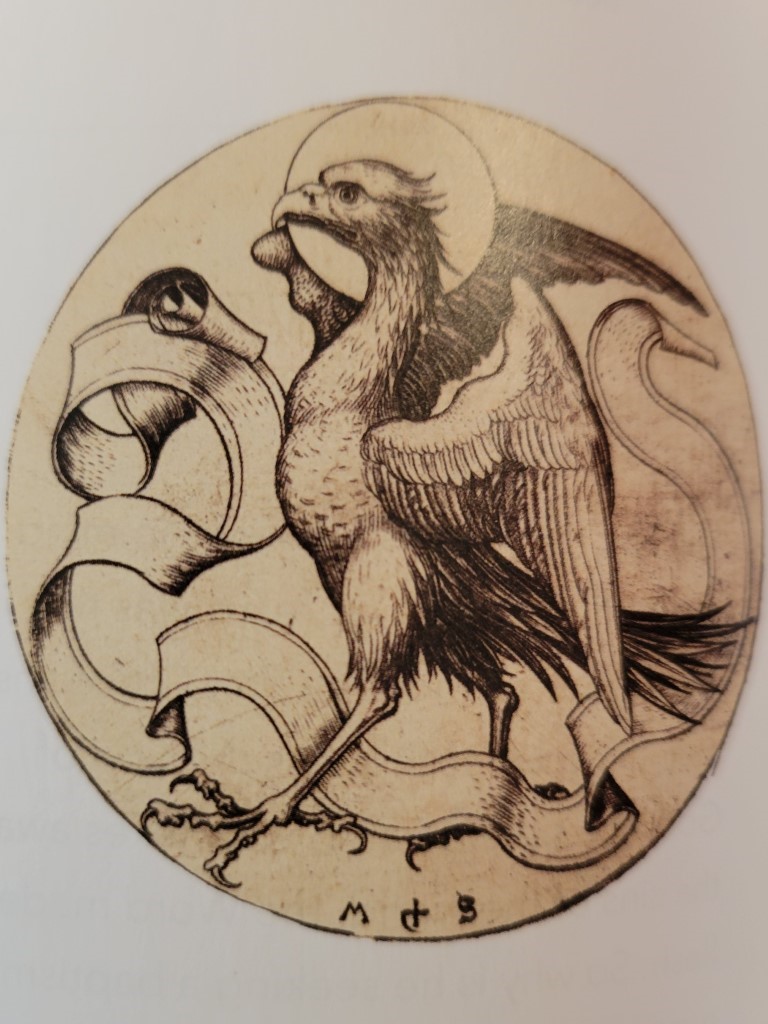
In St. Jerome’s scheme, the eagle is linked to John’s gospel, which begins by ‘flying upwards’ to the heights of the theological realm, “In the beginning was the Word”.
Matthew starts with Jesus’ genealogy to situate him in the story of mankind; Mark, at the good news of Jesus’ birth; and Luke, with his intention to give an orderly account of Jesus’ life. But John starts simply and powerfully with the beginning of everything:
John 1:1 – In the beginning was the Word, and the Word was with God, and the Word was God.
St. John Chrysostom (349-407) describes the phrase ‘in the beginning’ as “the expression of eternal and limitless being”. To return humankind, who have strayed from this limitless being, to the path of God, Jesus embodies the covenant in person and is the sacrificial lamb.
John 3:16 – For God so loved the world that he gave his only Son, so that everyone who believes in him may not perish but may have eternal life.
Throughout his ministry, Jesus faced opposition, bringing “into sharp relief a basic form of human dysfunction: our preference for the patterns of exclusion, domination, division, and violence,” says Bishop Barron. But even when we satisfy all our human needs and desires, they are never satisfied forever.
Eternal satisfaction comes only from spirit and truth, from God. And the food for the journey comes only from the Eucharist—the body and blood of Jesus.
John 10:11 – I am the good shepherd. The good shepherd lays down his life for his sheep.
But like a good parent, Jesus must be a warrior, too, to battle with the forces that lead us astray and deny us the grace of God.
John 11:25-26 – Jesus said to her, “I am the resurrection and the life. Those who believe in me, even though they die, will live, and everyone who lives and believes in me will never die.”
The centre of Christianity is love—God’s love for us, our love for Him and each other.
John 15:12-13 – “This is my commandment, that you love one another as I have loved you. No one has greater love than this, to lay down one’s life for one’s friends.”
The Rock of Western Civilization
Thomas Aquinas teaches that the laws that govern our Western societies are grounded in natural law, the first principles of our moral foundation. Natural law is grounded in the eternal law, God’s commandments to his human flock. A great and good manifestation of this Thomistic understanding is embedded in the American Declaration of Independence—the right to life, liberty and the pursuit of happiness as ‘endowed by the Creator’.
I will end on Thomas Aquinas’ words, “…even an infinite number of human words cannot equal one word of God’. The gospels report God’s words. Read the gospels. They will bring inspiration and comfort in this time of “moral governance by public opinion poll,” as Bishop Barron observes.

